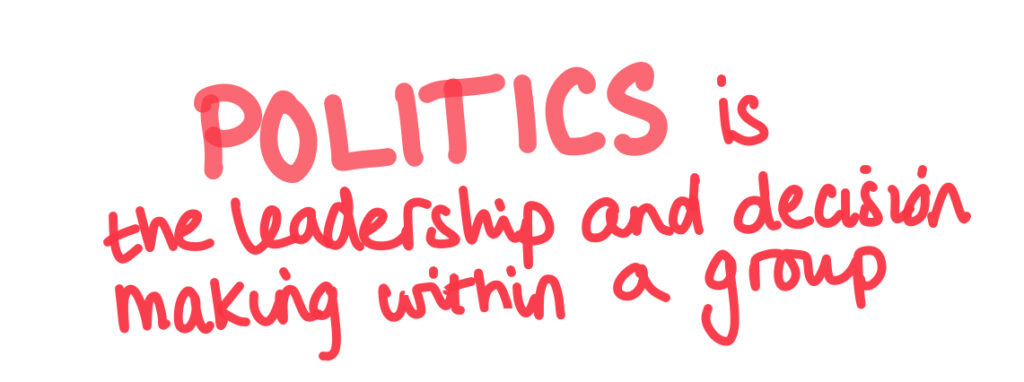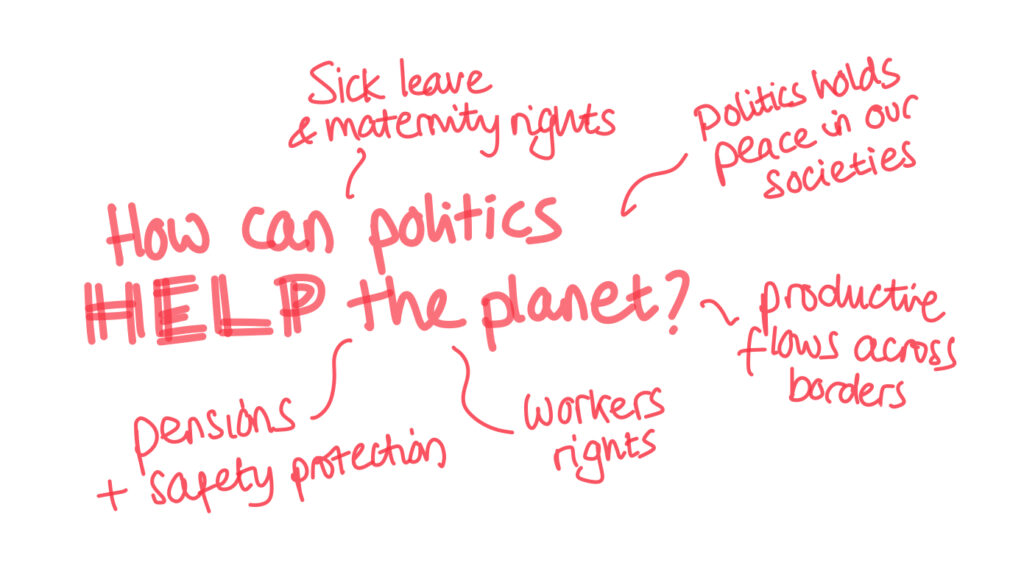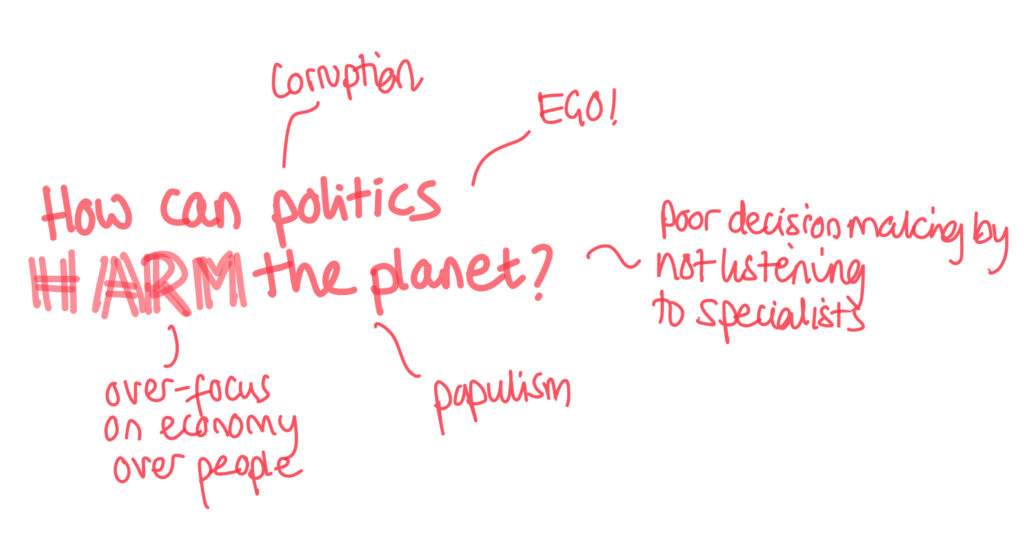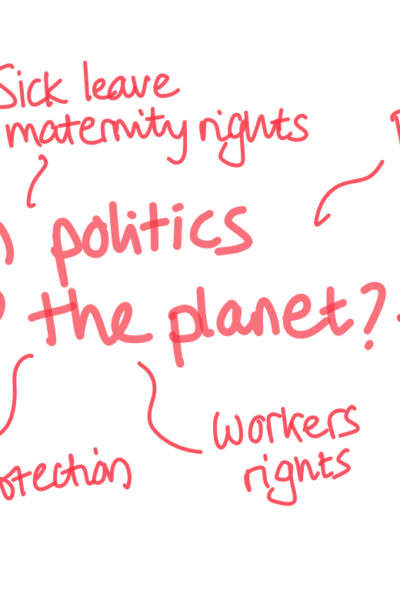We know that politics can be good, and can be bad; in this post, we explore- does politics harm or help the planet.
What is politics?
Politics is the leadership and decision making within a group. This could be a group of people, a group of counties, or an organisation of any type. In some ways, we know politics is brilliant. When conflict arises we try to solve it with politics rather than war. When there is a global problem like climate change, we rely on politics between groups to come to an agreement on limiting fossil fuels.

But there are also times when politics seems like a really frustrating game that stops real progress. ‘Playing politics’ is what you’d accuse groups of when they do petty things to try and ‘score’ against each other. It’s like bickering- but also it’s what we hear frequently on the news, being reported from the most influential people in this country. These are the people who should be doing real work to improve the lives of millions of people.
This blog post will explore the questions: Does politics harm or help the planet? We explore this in two ways:
- First I’ll talk about all the ways politics is good and can help the planet.
- Then, I’ll explore the way in which politics might be doing harm.
1. How can politics help the planet?
Politics is what holds peace in our society. In the past, there would have been thousands of individual family clans in the country who would have had their own land, area and skills or products. If there was a feud between tribes or a dispute over land, they would have fought each other. The victor would get their way and conquer the tribe they’d just defeated. There are areas of the world that still have structures like this- in paua new guinea for example, where, between remote jungle dwellings, fights are still the resolver of family conflicts.
To politics, we owe the peace that we experience in our everyday lives.
Politics, as we understand it – i.e. the way our country is controlled – has improved the country and the lives of the people in the best way. This has led to great, socio-economic developments. For example, workers rights, and protection. Sick leave, maternity leave, employer responsibility for safety in the workplace, legal pensions and legal rights for discrimination etc are all political solutions to protect the people and improve the quality of the workforce of the country.

Politics is the solution to globalisation
Since the world is global and trades on a global scale, politics is needed to regulate flow across the borders. This means flows of people and flows of trade. There is no other way to control these processes; since the invention of atomic weapons, a global war would be the death of humanity. So, we need to work disputes out with political strength. Not in physical strength or with weapons capability. Though with a show of political strength comes some political game-playing. This takes us, nicely, over the less helpful sides of politics.
How can politics harm the planet?
EGO is maintaining a favourable view of oneself. Acting on Ego is where self-interest is the root cause of the behaviour. It’s pride, hiding shame, bravado, being so scared (on the inside) of failure that the vulnerability is masked.
We have a country run by people who are specialists in ‘politics’. At best, they might have a background in one or two of the areas they manage. In any case, they won’t know more than someone who works in a particular field every day. They definitely won’t know more than someone who has worked in a particular field for the whole of their lives. Although the country is run by politicians, what is the risk that their ego will make decisions? What if they are not humble enough to observe the limitations of what they know? Their efforts should go into politics; the facilitating groups of feedback, questioning, finding out the struggles people have and bringing these back to solve in parliament in the best way possible.

Politics and populism
The way humans react to threats is by retruding into social groups as a structure to protect themselves. This forms fractions within our society that create distrust, segregation and feelings of being hard done by. This is what happens with populism. Modern popoulaism came about with a certain group of society who felt threatened by changes in society. Rightly or wrongly, they felt their voices were not being heard. Instead of dealing with this in a productive, political way, populism puts the blame on other, more vulnerable groups of society. For example refugees. Populist groups marginalise refugees and put them as figure on the opposing side of the ‘threat’ they experience.
The competition this creates is unnecessary and nasty. As a result, the potential of all these refugees can’t be used. They are educated people; doctors, lawyers, teachers, but they’re crammed in horrendous conditions. It’s would be no surprise if mutual negative feelings were fostered. If there were better ethics, and morals instilled in the people of a country; could the catastrophe of refugees be regarded with empathy, not threat?
Politics and money
One more reason politics can do more harm; politics is often completely entangled with flows of money. Politics can be at the total mercy of big, finance houses. Economics is so important, it can steal focus away from politics concerned with improving the lives of people.
In the UK, finance is the biggest economic sector. Political attention needs to give the finance people everything they want. This ‘giving the finance’ people everything involves syphoning money from other areas of the economy. It syphons money from regular people to a select few who live and work in finance; doing no ‘good’ for the masses. Furthermore, since money is so powerful, there is no way it does not corrupt the decisions of the government. Big multinational companies work closely with politicians, and politicians will often (before or after their time in office) consult for them. There will be no shortage of connections and potential routes of influence. This is so unfair to the majority of the country; and so, of course, there is anger and frustration.

The final point on politics doing harm is the lack of empathy shown by most people in the highest poisions of leadership. If empathy is the ”ability to understand and share the feelings of others”, then we need to have people in charge who have lived in the trenches. Or we need to put the emphasis on special focus groups of people in the trenches. If the goal of politics is to run a country in the best way for as many people; surely this must be the single most important skill for ruling groups to exhibit.
Conclusions- does politics harm or help the planet?
Politics, at least in a global sense, is a relatively new thing. There was no global planet before, the sailors went travelling in the 14/1500s and began exploring all corners of the world. After exploration came colonisation; that was very much a one-way power struggle. While the act of colonising was, of course political, it was not the intention of the colonists to govern in the best way for the people. It was not their intention to interact with other states to negotiate and find ways of peacefully resolving conflict. A lot of people were killed, in fact. It was only really around the time of the two world wars and the response to those that saw, maybe not the first, but the earliest significant leaps in global political discussion. And that’s only really just over 100 years ago compared with the six million years humans have lived on earth.
There are hundreds of distinctly different ancient ways of politically running peacefull groups all over the world, from which there could be a lot to learn. But global politics as we have it today is still relatively new, and still has a lot of space for improvement.
Overall, we need to work as well as we can to male politics rule in the best, fairest, empathetic and inspirational way possible.
I hope you enjoyed this post; does politics harm or help the planet? If so, you may enjoy some of our other content:

